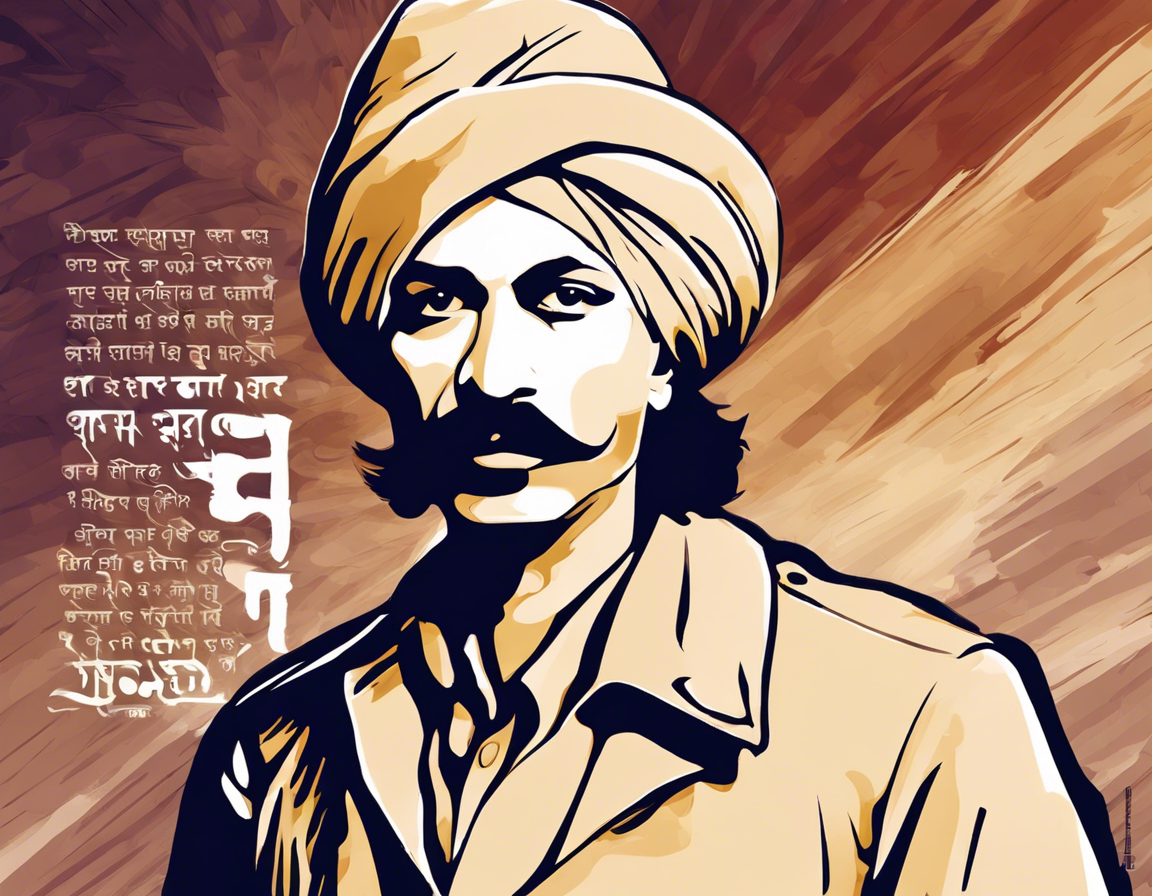Introduction
In the annals of Indian history, there are few revolutionaries as iconic and revered as Bhagat Singh. Born on September 28, 1907, in Banga, Punjab, Bhagat Singh was a fearless freedom fighter who played a pivotal role in India’s struggle for independence from British colonial rule. His charismatic persona, unwavering commitment to the cause of freedom, and revolutionary zeal made him a symbol of resistance against oppression and injustice. In this article, we will delve deep into the life, ideology, and legacy of Bhagat Singh, exploring the man behind the revolutionary slogans that continue to inspire generations.
Early Life and Influences
Bhagat Singh was born into a Sikh family that had a history of political activism and patriotism. His father, Kishan Singh, and uncle, Ajit Singh, were both prominent leaders in the freedom movement, exposing young Bhagat Singh to nationalist ideas and fervor from an early age. Influenced by the likes of Lala Lajpat Rai, Bal Gangadhar Tilak, and Mahatma Gandhi, Bhagat Singh developed a deep sense of patriotism and nationalism that would shape his future endeavors.
Education and Political Awakening
Despite coming from a family with a strong political background, Bhagat Singh’s formal education was cut short due to his involvement in anti-colonial activities. He was deeply disturbed by the Jallianwala Bagh massacre in 1919, which left an indelible mark on his consciousness. This incident, along with the non-cooperation movement led by Gandhi, propelled Bhagat Singh into the vortex of India’s freedom struggle.
Involvement in Revolutionary Activities
Bhagat Singh was drawn to more radical forms of protest against British rule. Along with his associates Sukhdev and Rajguru, he carried out several acts of resistance, including the famous assassination of J.P. Saunders in 1928. This event not only shook the foundations of the British Raj but also catapulted Bhagat Singh into the limelight as a daring and resolute freedom fighter.
The Lahore Conspiracy Case and Martyrdom
The bombing of the Central Legislative Assembly in Delhi in 1929 marked a turning point in Bhagat Singh’s life. In a bold statement against colonial oppression, Bhagat Singh and his comrades threw smoke bombs and pamphlets, shouting “Inquilab Zindabad” (“Long Live the Revolution”). Subsequently, Bhagat Singh, Sukhdev, and Rajguru were arrested and implicated in the Lahore Conspiracy Case.
During the trial, Bhagat Singh and his co-accused used the court as a platform to espouse their revolutionary ideals and advocate for a free and independent India. Bhagat Singh’s bravery, intellect, and unwavering commitment to the cause of freedom captured the imagination of the masses, making him a folk hero and symbol of resistance.
On March 23, 1931, Bhagat Singh, along with Sukhdev and Rajguru, was hanged in Lahore Central Jail by the British authorities. The martyrdom of these young revolutionaries sent shockwaves across the nation and galvanized the freedom movement. Bhagat Singh’s last words “Down with British imperialism” reverberated throughout India, inspiring millions to join the struggle for independence.
Ideology and Legacy
Bhagat Singh’s ideology was a unique blend of socialism, anarchism, and secularism. He believed in the power of the youth to bring about social change and championed the cause of democracy and equality. Bhagat Singh’s vision for India was rooted in justice, freedom, and unity, where every individual had the right to dignity and self-determination.
The legacy of Bhagat Singh transcends time and continues to inspire generations of freedom fighters, activists, and revolutionaries. His courage, intellect, and sacrifice serve as a beacon of hope for those fighting against injustice and oppression. Bhagat Singh’s call for revolution and resistance remains as relevant today as it was during the days of colonial rule.
Frequently Asked Questions (FAQs)
1. What were Bhagat Singh’s main contributions to the Indian freedom struggle?
– Bhagat Singh was a key figure in India’s fight for independence, known for his participation in revolutionary activities, including the Lahore Conspiracy Case and the bombing of the Central Legislative Assembly.
2. What was the significance of Bhagat Singh’s participation in the Lahore Conspiracy Case?
– Bhagat Singh’s trial in the Lahore Conspiracy Case brought international attention to the cause of Indian independence and showcased his unwavering commitment to freedom and justice.
3. How did Bhagat Singh’s ideology differ from other freedom fighters of his time?
– Bhagat Singh’s ideology was marked by a blend of socialism, anarchism, and secularism, setting him apart from more mainstream nationalist leaders.
4. What impact did Bhagat Singh’s martyrdom have on the Indian freedom movement?
– Bhagat Singh’s execution by the British authorities sparked widespread protests and served as a catalyst for the intensification of the struggle against colonial rule.
5. How is Bhagat Singh remembered in modern India?
– Bhagat Singh is revered as a national hero in India, with his birthday commemorated as Shaheed Diwas (Martyrs’ Day) to honor his sacrifices and contributions to the freedom struggle.
Conclusion
In conclusion, Bhagat Singh’s legacy as a revolutionary thinker and freedom fighter endures through the annals of history. His fearlessness, ideals, and sacrifices continue to inspire millions to uphold the values of justice, equality, and freedom. Bhagat Singh’s clarion call for revolution and resistance reverberates across generations, reminding us of the power of courage and determination in the face of oppression. As we pay homage to this iconic figure, let us strive to embody his spirit of unwavering commitment to the quest for a just and equitable society.
